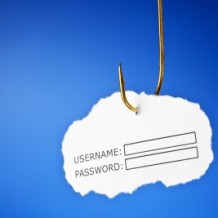Beware the Lure of the Phisherman

Sadly, there are all kinds of people whose only desire is to disrupt people’s lives for personal gain. One of the ways they do this is by attempting to access sensitive material, such as passwords and banking information through email. This is known as ‘phishing’.
Phishing is one of the dangers of this amazing computer age, so instead of complaining about it, take the opportunity to educate and protect yourself.
Some of the most common phishing scams are:
- Strange emails from people you know,
- Emails from financial institutions asking you to login to your account for whatever reason, and
- Emails from strangers who say they just need a few thousand dollars in order to retrieve millions of dollars that are rightfully theirs.
Here’s how to deal with each type
Strange emails from friends: Usually these have only a web link in the body of the email and a catchy subject line like “Check this out” or “Best website I’ve ever seen”. Do NOT click on the web site. Doing so will almost certainly download a MalWare to your computer and screw up your hard drive enough to make you pull your hair out, cost you time and money to fix, and possibly even lose you important files in the process.
Instead, email your friend and say that you think their email address book has been hacked and is sending out dangerous spam under their name and from their email address. The solution for them should include:
- Alerting their contacts with a second email saying “I think my email has been hacked” in the subject line and a message advising them NOT to open any web links that they have not personally commented on.
- Immediately changing their password on the account that has been hacked. This should prevent further problems.
- If a password change is not sufficient then cancel that email account altogether and set up a new one.
- Remind them that they have not been personally targeted but randomly hacked through a program that has been set to Phish for victims on major web sites.
Emails from financial institutions asking you to login: Do NOT login to the website link in the email. Find out from the financial institution being imitated how to report spam to them. Then forward the phishing email to them so they can investigate and solve the problem.
Strangers asking for money: Delete. Delete. Delete! Don’t even risk allowing them to pull your heartstrings. Save your warm-heartedness for someone you know personally.
The Good News! Phishing software can only Phish for email addresses, not passwords, otherwise the hackers would not be trying to trick you into entering your password on their cleverly designed login pages. It’s the login that provides that information for them, so resist the temptation.
Love what this computer age can do for your life and business, but play it safe and don’t get hooked by a phisherman.






